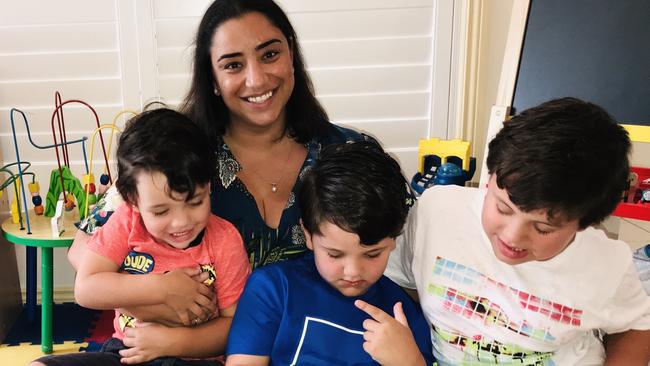‘Safety, human rights violated’: Mum tells why autistic people need understanding and how it can be done
A mother of autistic children has created a national training program to open the eyes of those dealing with people on the spectrum.

SmartDaily
Don't miss out on the headlines from SmartDaily. Followed categories will be added to My News.
A clear and urgent need for better communication with people on the spectrum has prompted an Australian mother of autistic children to develop a national training program.
Spectrum Support founder Kathrine Peereboom says that given one in 70 Australians are affected by autism, more knowledge of the condition is crucial.
“We urgently need greater understanding, awareness and acceptance, otherwise we risk alienating many people on the spectrum who already feel very lonely and isolated,’’ she says.
“Better understanding autism will help people engage with autistic people in a real, authentic, kind and supportive way.’’
Ms Peereboom, who has three severely autistic sons, developed her training with the autism community and the world’s leading police and frontline service providers, to support community workers and citizens.
“Too many autistic people have faced upsetting and dangerous situations where their safety and human rights have been violated due to a lack of understanding,’’ she says.
The program already has been adopted by Queensland Police, NSW Police and Ms Peereboom is presently in talks with Victoria Police.
Snr-Sgt Gregory Giles of Queensland Police says the training is the first of its kind to be delivered in the Sunshine State.
“It provides participants with the skill, knowledge and attitude to improve officers’ performance and provide a better service to the community in Queensland,’’ Giles says.
Autism Spectrum Australia, known as Aspect, has also developed a training program, which was trialled recently with the Australian Federal Police and is being rolled out in South Australia.
Aspect Research Centre for Autism Practice national manager Vicki Gibbs says many police protocols don’t prepare officers to adequately identify and support people on the spectrum.
“Knowing how to support someone and de-escalate a situation that involves someone who is on the autism spectrum in a high-stress situation is a hugely important skill for police and other emergency workers operating on the frontline,’’ Gibbs says.
Ms Peereboom says an autistic person may have an impaired sense of danger, be scared of police, avoid eye contact, have delayed speech or language skills or not understand or be able to respond to verbal commands.
“It is essential that police officers understand these behaviours and how to work with them,’’ she says.
Her mission to affect social change began as a personal quest to improve broader communication for her sons Oliver, 8, Joshua, 7 and Tyler, 6.
“Every time we see them build a relationship or have a connection where they feel at ease, we get that glimmer of hope,’’ she says.
It’s difficult to generalise about how to recognise someone on the spectrum, defined as a neurological condition around how the brain processes social cues, emotions and language. Signs of the condition vary from mild to severe, but typical signs in early childhood include an inability to look and point at objects and hold eye contact.
“If you’re not sure how to communicate with an autistic person … ask them how they like to communicate, what they like, what they don’t like and what annoys them,’’ Ms Peereboom says.
Gold Coast speech pathologist Sharon Cummings, from My Speech Centre, recommends being respectful when meeting someone with autism and realising the parent of a child with autism is doing their best.
“If you see a child melting down in a shopping centre, understand the parent isn’t causing it, they’re just supporting their child who is overwhelmed by what’s happening around them,’’ Cummings says.
“Being flexible, accommodating and kind is crucial.”
PITFALLS AND PATHWAYS

JUST because you’ve seen Rain Man or The Big Bang Theory, don’t assume everyone with autism will be a quantum physicist.
STRESS, anxiety, change of routine, or being in the spotlight can trigger a meltdown, along with crowds, noises and perfume.
IF someone is sitting alone at a social gathering, wave from a distance before approaching. This helps them feel included but not pressured. They will approach you if they want to.
IF you shake hands on first meeting a person with autism, repeat that on the second meeting. Sameness is important.
GIVE them space and time to process their surroundings.
MANY people on the autism spectrum find reading social cues and body language very challenging. Be patient and understanding.
USE direct, clear and easy-to-follow communication, as people on the spectrum sometimes take words and phrases literally.
DON’T be offended if they repeat your words (they’re just making sure they understand) or if they use frank, honest and direct language (it’s not intended to be rude or inappropriate).
Source: Speech pathologist Sharon Cummings and Aspect Spectrum Australia


